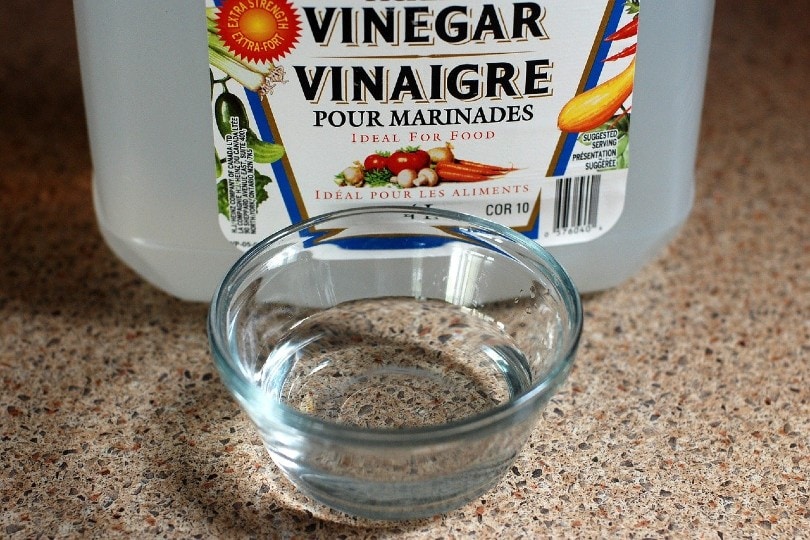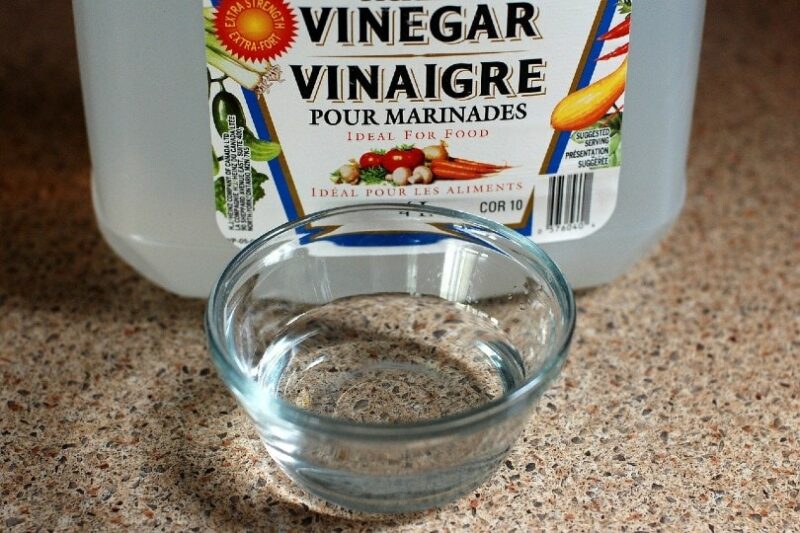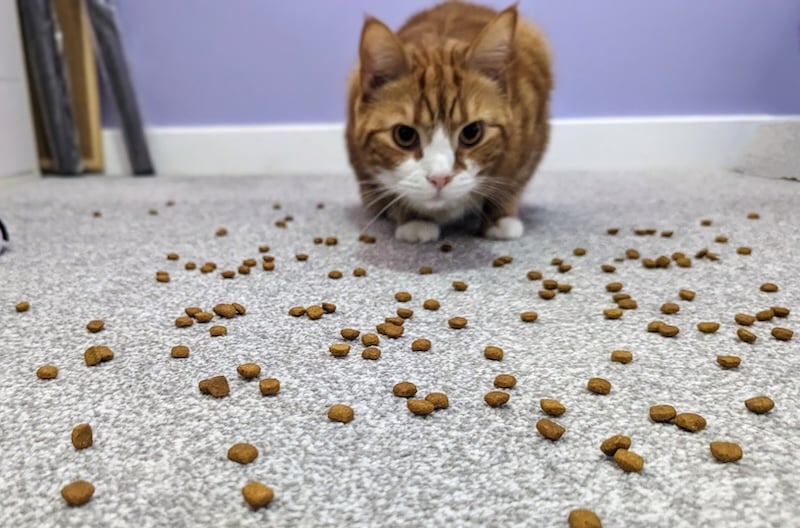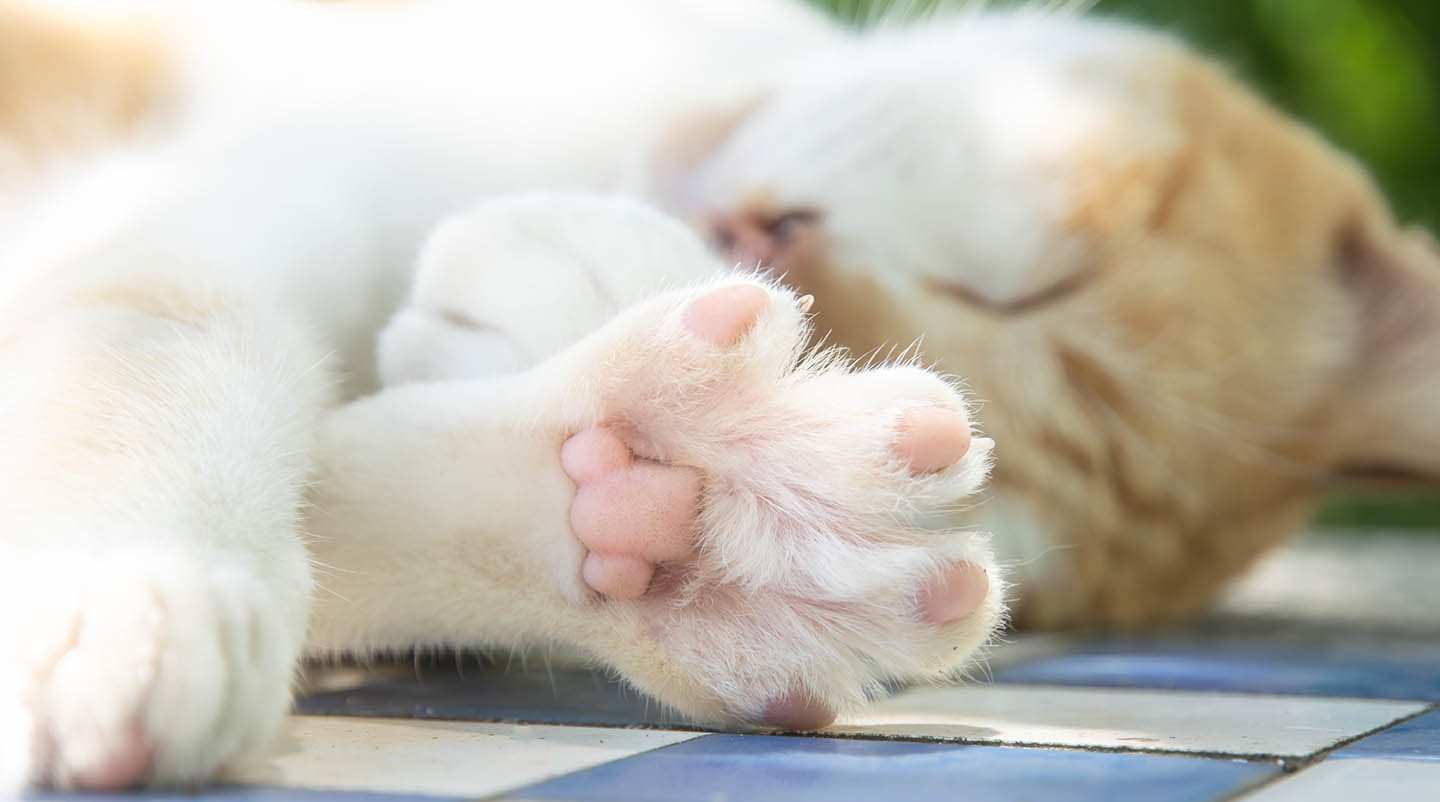Is keeping vinegar in your house safe to do if you have cats? Vinegar is well-known for being an effective household cleaner, tasting yummy on food as a condiment, or even being used as a health supplement in the form of apple cider vinegar.
But is using vinegar around your cat going to do any harm? Before we take a closer look, we can say that vinegar, both regular white and apple cider, is not toxic for your cat.
Both can be used safely around your cat as a cleaner, a topical treatment, or a dietary supplement in very small doses.
Uses for Vinegar
- As a household cleaner
- As a dietary supplement
- As a topical treatment

Vinegar as a Household Cleaner
White vinegar is a natural and non-toxic cleaner that you can use around your cat.
In fact, as an acid, vinegar is an effective way to neutralize alkaline cat urine. You can mix 1 cup of white vinegar with 1 cup of water and either spray or soak any areas you want to clean. Once the vinegar smell dissipates, you should find that the smell of urine has also gone!
Apple Cider Vinegar as a Supplement
This type of vinegar is well-known for its health advantages for us humans, but are the same benefits extended to our cats?
- Respiratory infections
- Urinary tract disease
- Constipation
- Allergies
- Skin infections
- Flea infestations
- Asthma
To our knowledge, there haven’t been any scientific studies confirming the health benefits of adding apple cider vinegar to your cat’s diet or using it topically. So, while it may do them some good, other proven supplements could do a better job.

Apple Cider Vinegar as a Dietary Supplement
If you do decide to add apple cider vinegar to your cat’s diet, start with 1/2 a teaspoon of diluted cider vinegar added to your cat’s food or water. You can work your way up to 1 teaspoon’s worth once a day, but keep an eye on whether your cat is eating or drinking enough.
If your cat doesn’t seem to like the taste or won’t drink water with vinegar added, it’s probably best to stop using it. As cats don’t have a high thirst drive in any case, they can quickly become dehydrated. So, adding something that they might not like to their water could be counterintuitive.
If you really want to add it to your cat’s water, it’s a good idea to provide them with an alternative source of plain, untreated water too. If you can, keep an eye on your cat, and see if they are drinking the water with vinegar added.
Adding apple cider vinegar to your cat’s wet food and mixing it in is probably a better option. But again, if they don’t seem to like the taste or refuse to eat it, it’s best to stop.
Apple cider vinegar may have a laxative effect, so if you see your cat suffering from diarrhea, discontinue using it until their stools are back to normal.

Apple Cider Vinegar as a Topical Skin Supplement
There are a few different uses for apple cider vinegar as a topical application. Again, there isn’t anything to prove that these work, but here are a few simple recipes for popular treatments.
Skin Infections
Mix 2 teaspoons of apple cider vinegar with 1 cup of spring water. Apply the solution up to twice a day, and look for improvements.
Ear Infections
Mix 1/2 a cup of apple cider vinegar with 1/2 a cup of rubbing alcohol. Use a cotton ball to apply the mixture to your cat’s ears. Don’t rub too hard. You can apply this twice a day.
Flea Treatment
Mix 1/2 a cup of apple cider vinegar with 1/2 a cup of spring water. Either apply using a spray bottle or a cloth. Thoroughly wet your cat’s coat, and work the solution all the way down to their skin.
- Related Read: Natural Home Remedies for Cats With Fleas


A Note on Cats With Kidney Disease
Cats with kidney disease should never have apple cider vinegar added to their diets. The acidity is too high, and your cat will struggle to process it. Felines need an alkaline diet, so adding acidic vinegar will do more harm than good.
We wouldn’t even recommend using a topical skin treatment made with apple cider vinegar on a cat with kidney problems. It’s just not worth the risk.
 Wrapping It Up
Wrapping It Up
As with any dietary supplement, consult your veterinarian before adding apple cider vinegar to your cat’s food or using it as a topical application. Never use undiluted apple cider vinegar as a dietary or topical supplement.
There are no scientific studies proving the effectiveness or benefit of apple cider vinegar for cats. So, this is one supplement that’s fine to use in small doses, but it might not actually be doing your cat any good.
There are plenty of proven supplements out there that can do a better and more effective job of treating a wide range of ailments.
White vinegar does work at neutralizing stubborn cat urine stains, and when it comes to that, it’s always good to have a few different options!
Featured Image Credit: NatureFriend, Pixabay






